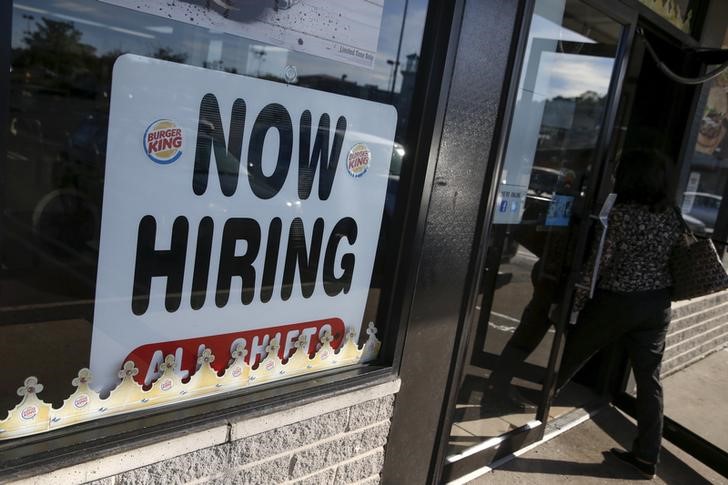 © Reuters.
© Reuters. By Geoffrey Smith
Investing.com — Initial jobless claims are set to slow further from their eye-watering pandemic peak, while continuing claims are expected to dip below 20 million for the first time since April The ECB gets a vote of confidence from banks as they take advantage of its cheapest-ever loan, while the Bank of England is expected to increase its bond-buying program later. Stocks are set to open mixed amid concerns over a new wave of virus infections and the threat of trade tension with the EU, while President Trump called John Bolton a liar after the former National Security Advisor depicted him as a re-election-obsessed supplicant to Xi Jinping. Here’s what you need to know in financial markets on Thursday, June 18th.
1. Jobless claims set to continue falling
The latest weekly set of jobless claims is set to be published at 8:30 AM ET (1230 GMT), at a time when a rise in new Covid-19 infections is raising fears of another wave of job-killing lockdown measures.
Analysts expect initial claims to fall to 1.30 million last week, which would be the lowest since the first lockdowns started to bite in late March, and down from 1.54 million the previous week. Continuing claims, which indirectly reflect the speed at which people are being rehired, are expected to dip below 20 million for the first time since April, at 19.80 million.
The numbers will be released simultaneously with the Philadelphia Fed’s regional business survey. The New York Fed’s Empire State survey earlier this week showed a stronger-than-expected rebound in manufacturing activity.
2. Banks vindicate ECB’s rate cut with biggest-ever liquidity operation
The European Central Bank carried out its biggest ever single injection of liquidity into the eurozone’s money markets, in an apparent vindication of its move to push interest rates still further into negative territory last month.
Banks borrowed 1.308 trillion ($1.47 trillion) from the ECB’s latest Targeted Long-Term Refinancing Operation, or TLTRO, the first to offer a rate as low as -1% for banks that meet the ECB’s lending criteria (which means nearly all of them). After netting out money that is being shifted from other outstanding ECB loans this week, it still adds up to a liquidity injection of 548 billion euros.
The high demand implies that the lower rate isn’t as destructive as some had feared with regard to bank profitability. Pictet Wealth Management economist Frederik Ducrozet said it will result in a net transfer of 15 billion euros to the participating banks. The euro was little changed at $1.1248, while sovereign bond spreads tightened modestly.
3. Stocks set to open mixed
U.S. stocks are set to open mixed, as concerns about the coronavirus and an increase in political noise undermine confidence in a V-shaped economic recovery.
By 6:30 AM ET (1030 GMT), the Dow Jones 30 futures contract was down 31 points, or 0.1%, while the S&P 500 futures contract was down 0.1% and the contract was up less than 0.1%.
Stocks in focus on Thursday will include T-Mobile, which predicted a healthy rise in customers this year after the closing bell on Wednesday. That should offset concerns about higher-than-expected one-off costs from its merger with Sprint, and a bigger-than-expected hit from Covid-19 related provisions.
Big tech will also be in focus after the U.S. effectively pulled out of international talks on a new framework for taxing multinational companies. That makes the imposition of digital services taxes in key markets in Europe likelier – as well as a U.S. response in the form of fresh import tariffs.
4. Bank of England expected to increase QE
The Bank of England is expected to ramp up its monetary support for the U.K. economy at its Monetary Policy Committee meeting.
Analysts expect the BoE to increase its asset purchase program by at least another 100 billion pounds, given that the current pace of bond-buying will exhaust it by September.
The Organization for Economic Cooperation and Development warned last week that the U.K. economy will shrink by the most of any in the G7 this year due to the Covid-19 pandemic. The country was slow to impose lockdown and social distancing requirements and its economy has a disproportionately high exposure to services, which have suffered more than manufacturing in the downturn.
The pound drifted down 0.6% to a two-week low against the dollar at $1.2485, and also slid to its lowest against the euro since late March.
Elsewhere, the Swiss and Norwegian central banks kept their key rates unchanged, while Indonesia’s cut again.
5. Trump brands Bolton a liar after claims of weakness in front of Xi
Former National Security Advisor John Bolton denounced President Donald Trump in widely-trailed excerpt from his soon-to-be-published memoir.
Bolton said Trump had sought the help of President Xi Jinping in getting re-elected in 2020 by engineering a trade deal that he could present as a triumph, and had repeatedly made concessions to Xi despite long-standing U.S. concerns about Chinese intellectual property theft, currency manipulation and human rights observations (Bolton noted on the latter that Trump privately endorsed the establishment of concentration camps for China’s Muslim minority in its western Xinjiang province).
Trump, whose first two years in office were overshadowed by evidence of his soliciting Russian help in the 2016 election campaign, responded by calling Bolton a liar.
Bolton also criticised the Democratic Party for not broadening its efforts to have Trump impeached for abuse of office. Bolton declined to testify at the impeachment hearings last year, preferring to save his revelations for his publishers.




0 Comments:
Post a Comment